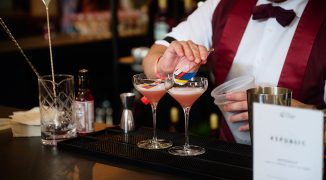Every city needs a bar, or a small district of them, where locals can go to escape the madness. Places to sit down and forget the world while enjoying a drink, or several, amongst friends; where bartenders know orders before customers ask for them; where all the hardworking men and women of the neighborhood can come to unwind; where if a few too many were had, well, it happens — be sure to visit us again.
The same holds true in Washington, D.C., except some of these bars are more likely to be doling out Louis XIII than happy hour boilermakers, and some of those hardworking folks might still be working hard, but as secret service or bodyguards for whichever political bigwig is kicking back. These are places “where everybody knows your name.” It just happens that the names might be Chuck (Schumer) or Teddy (Cruz).
To explore the world of Washington, D.C.’s iconic hotel bars, none more than a short walk from the other or the White House, let’s embark on a tour. Our first stop: the Round Robin Bar at The Willard, which has a history stretching back to the early 1800s.
“The legacy of the Willard hotel goes back almost 200 years,” says head bar manager Jim Hewes. “This is the oldest bar in operation in Washington. Others say they’re old… they’re not.”
It’s the middle of the afternoon, but the bar is already bustling. Hewes, a constant stream of motion, is presiding over a humming crowd. He’s been at the Round Robin since 1986, when the hotel and bar reopened as part of the InterContinental hotel group. Hewes has long since mastered the bar’s signature Mint Julep, brought to D.C. by Henry Clay, who during his career served as a member of both the Senate and House of Representatives as well as Secretary of State.
When Clay came to D.C., like any good Kentuckian, he brought along some bourbon with him. “Henry Clay would get people together after a session in the Senate and he would mix Mint Juleps,” explains Hewes, who is as much barman as historian, drink maker as storyteller. “What better way to compromise over the issues of the day? He was known as the ‘great compromiser.’”
What Hewes serves up now is the same as what Clay served then. “I’m somewhat of a collector,” says Hewes, “and years ago when I started working here, I picked up this old cookbook, over 100 years old. This note card falls out, and the card has an engraving on it. It says ‘Southern Style Mint Julep,’ and it’s Henry Clay’s recipe, the original, handwritten.”
Not only is the recipe for that Southern Style Mint Julep as authentic as it gets, but as it’s being sipped, “you’re sitting where Thomas Jefferson had a drink,” extols Hewes. “You’re sitting where presidents going back to the early 19th century sat and drank.”
So sip on that Mint Julep and if Hewes is behind the bar, prepare to soak up the history with a good tale or two. He may offer up the story of the murder which took place in The Willard’s dining room in the 1850s, or the duel between Clay and John Randolph, or how the property was originally purchased by the Tayloe family, or how before he found that recipe, the bar wanted to use Jack Daniel’s rather than Kentucky bourbon in its julep.rn
Next, stroll down Pennsylvania Avenue, past The White House’s North Lawn and up onto 16th Street, and enter The Hay-Adams Hotel. Take a back staircase to Off the Record, hidden away in the hotel’s basement. Noise from the bustling scene beneath, filled with after-work political staffers eager for refreshment, beckons visitors to join the fray.
“We wanted to create an atmosphere where you really feel that you’re in the shadows of Washington, the underground community,” explains Julien Surget, Director of Food & Beverage at the hotel. “One of the things we say is that this is the place to be seen, but not heard, and it’s true.”
Guests may come for a variety of reasons, but many do so simply for the comfort of a regular’s bar. “People come here because they know it’s going to private, they’re going to be amongst peers, nobody’s going to bother them or take pictures,” says Surget. “We still maintain our regulars who come when they want a quiet, private spot.”
Or, they may come for one of the bar’s mammoth 9-ounce Manhattans, made with rye and Carpano Antica Formula. With 7.5 ounces of whiskey, this beast is a bargain at any price, and at $16 it’s actually a steal.
“You’re paying for the experience,” says Surget. “That’s where our success lies. You really feel like you’re being treated properly… when people say they don’t like the value of something, they’re not saying it’s too expensive, they’re saying they didn’t get what they were really paying for. It’s less about how much you’re paying, and more about what you’re getting for it.”
Bartender Michel Rivera has been at Off the Record for five years, and emphasizes his role as offering consistently excellent and welcoming service, whoever it is that’s sitting down at the bar. “I just always treat people like a family member was sitting here,” he explains. “I just want to make sure that everyone who walks out of here says ‘we want to come back to this place.’”
If only the caricatures hanging on the wall or displayed on the bar’s famous political coasters could talk, because the bartenders won’t reveal much. “The most crazy things I’ve seen have been in here,” says a laughing Rivera. But that’s all he’s going to say about that.
Sharable anecdotes abound, though — the time John Boehner and former longtime bartender John Boswell signed each other’s coasters; the time a Homeland cast member found out he was being killed on the show during a cast reading at the bar.
Whether famous actors or CIA directors or anybody else though, the bar never cordons off space or clears out the room. “We have a golden rule, we never close down Off the Record,” says Surget.
“It’s too undermining for people, ‘well why for him and not for me?’ We don’t want to convey that sort of atmosphere where some people are more special than others. We treat everyone the same, from the office workers coming for happy hours to the CEOs who join us, everybody gets the same respect.”
During a recent visit, a debate was set to air later in the evening, so additional flat screen televisions were being brought in and the discussion turned to the delicate subject of politics. “There’s a secret talent to a guest feeling like you are agreeing with them even if you have never agreed or disagreed,” says Surget. “It’s something that’s important to us.”
Opinions are welcomed because everybody has them, but they play it down the middle. So whether it was a long day at the office, a long day in Congress, or a script reading that revealed an imminent death, a big, strong drink will be there waiting.
Just two corners up 16th is The St. Regis Bar, where they understand that sentiment. “You can see we have two television screens. So, one is on FOX, and one is CNN,” says bar manager Dewayne Wright with a chuckle. “No, really, we have to consciously think about that.”
Wright is new to the St. Regis D.C., but has been with the hotel group for years. “One of the reasons I came to D.C. to work for the St. Regis here was the proximity to the White House and for the history of the hotel. They’ve hosted every president in office.”
The bar is steeped in history, its back corner booth known as the General’s Booth, in honor of General John J. Pershing, the only American who garnered the title of General of the Armies while still in service. George Washington received the honor posthumously in 1976, as part of America’s bicentennial celebration. General Pershing chose his booth because he had a full view of the entrances and exits, and was also able to serve as the center of attention, taking out his silver flask to mix up Old Fashioneds for himself or a guest at his table.
“We focus on what we do and what we do best,” explains Wright. “That’s bespoke customer service, and it’s ingrained into us at the St. Regis.” Yet, while the St. Regis prides itself on being able to handle the unique needs and challenges of presidents, generals and royalty, what’s truly being strived for, as each of these establishments makes clear, is serving the local community and treating everyone as equals.
“I’ve learned to have a sense of… discretion, and a general sense of respect for people’s positions and to make sure that they feel like they’re welcome,” says Wright. “But we have always been successful with our local and our regular crowd that comes in and doesn’t stay in the hotel.”
Wright and his team takes great strides to take care of others in the industry, too. “We pay a lot of respect if we find that another bar manager, bartender, server or even a barback from one of the establishments in D.C. is here visiting us,” he says. “We take care of them and show as much hospitality as possible.”
In a city replete with swanky bars, it’s attention to detail that truly separates one place from the next, and leaves a lasting impression. “From a hospitality standpoint, give customers a great drink and great service,” explains bartender Reda Chentoufi. “You can get an Old Fashioned anywhere in the city. So it’s all about the experience and the quality… whatever it is, we’ll try to find a way. We always try to deliver bespoke service, and we try to make everything possible.”
That level of commitment to service can lead to some strong referral business. Chentoufi relays the story of a visitor coming in and ordering a Manhattan, just another customer in search of a drink. The guest though went on to tell him that he had just been in the White House, speaking with the President. He asked for where to go, and the President sent him to the St. Regis for that Manhattan.
Chentoufi has been at the St. Regis D.C. for three years, after a five year stint at the Atlanta location. His time in D.C. has been entirely different. “This is one of the best experiences I’ve had in my life,” he says.
“In this hotel, you never know who you could expect to come. So you always have to be at the highest level. So actually, the experience of the guest here in the hotel starts from the door… And when I’m behind the bar, I’m a part of the show.”
If you happen to be in the bar at 6 p.m. each evening, that show will include the St. Regis’s daily sabering ritual. Typically performed here by Wright, although Chentoufi and others are trained to do it as well, a bottle of Cava is sabered and glasses are offered gratis to guests in the bar and passersby in the lobby, a St. Regis tradition honoring the end of the day and beginning of evening’s festivities.
Continue strolling up 16th several more blocks to The Jefferson Hotel. Enter the lobby and weave through the hallways to Quill, an intimate lounge decked out with dark wooden walls and a glowing bar top, the sounds of a piano player luring nighttime visitors in.
There, Frank Crespo has been at the hotel for six years, behind the bar for five of them, striving for the same virtues and qualities that have been found over and over again on this journey. “Time is a commodity,” he explains. “When you go someplace and you’re spending your time there, then that’s the most valuable thing to you.”
Therefore, he aims to honor and appreciate that, while delivering efficient, accurate service to each guest. That doesn’t mean there has to be any type of elaborate show or charade though. “It’s just the sort of hugging comfort that any good place worth its salt provides,” he says.
“Our business needs to be cultivated in our community… Our clientele is people in the neighborhood. Listen, everybody is important in Washington. It’s about guest enjoyment. We want you to feel better when you leave here than when you came in.”
Before Crespo was indoctrinated into the world of D.C. hotel bar service, he drew inspiration from a familiar name you’ve already encountered on your exploration: The Willard. Crespo was at Cocktails in the Country with Gary Regan, and says that Jim Meehan was there as well. “He turned me onto Jim [Hewes], and I talked to him a few times,” recalls Crespo. “I almost ended up working The Willard and Jim told me what was happening here in the bar scene… so when the opportunity to work at a hotel bar here came, I knew exactly what it was, and I jumped on it.”
Now, Crespo calls himself “a lifer” at Quill, and focuses on delivering what has become a legacy of exceptional service. “One thing about this hotel that gives me perspective, I run into people every now and then who speak very fondly about the old Jefferson and the hospitality they were receiving,” he explains.
“Just amazing things, and people from every part of the hotel did something that was just above and beyond, and they remember that from 35 years ago. And I think about that and it blows my mind… you want to do the right thing. You want to be good at what you do.”
The St. Regis has its sabering; Off the Record its political coasters and caricatures; Round Robin the stories proffered by Hewes. Here at the Jefferson, they have Lord Monti, a rescue beagle and hotel mascot of sorts, with an eponymous cocktail on the menu. Pay your tab, give Lord Monti a farewell scratch behind the ear, and find yourself a ride home, concluding an iconic, D.C. hotel bar crawl fit for a king. Or a President.





